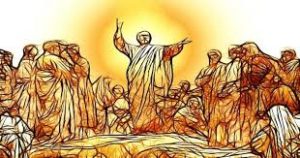The Sermon on the Mount
Matthew 5:3-16 and Luke 6:17-19

This section is generally referred to as the Sermon on the Mount. The problem with that title is that it merely captures the geographical location of where the event took place. It says nothing about the content. It is less than two thousand words long. Yet there is great power in its brevity. It may be the most important sermon in history.500
By this time there had been rising interest in Jesus’ messianic claims both inside and outside the land of Isra’el. It was a period of Jewish history when the Jewish people were looking for the messianic redemption. From the knowledge of the prophets of the TaNaKh, they knew that righteousness was the way into the Kingdom. There is no reason to expect B’rit Chadashah ethics to differ from TaNaKh ethics, since YHVH does not change. In the preceding four centuries, the Pharisees had developed and offered a form of righteousness that taught that all of Isra’el would have a share in the Kingdom age to come. It was a very broad road (Mt 7:13-14). They said that anyone who was born a Jew would inherit the kingdom of God. Only those who were faithful would have positions of authority in the Kingdom, but all Jews would enter into it. So the Pharisees claimed to offer Jews righteousness and a share in the Kingdom. But it was still a very broad road.
Then Jesus came along and challenged that very foundation. He taught that one must experience a new birth by accepting Yeshua as the Messiah to qualify for the Kingdom of God. Therefore, conflicts began to occur between the Lord and pharisaic Judaism. The question the common people were asking was this: Is pharisaic Judaism sufficient to enter the Kingdom of God? If not, what kind of righteousness is necessary?
When Yeshua said: For I tell you that unless your righteousness is far greater than that of the Torah-teachers and Pharisees, you will certainly not enter the Kingdom of Heaven (Mattityahu 5:20 CJB), He rejected pharisaic Judaism in two ways. First, the Galilean Rabbi rejected it as having a sufficient righteousness to enter the Kingdom; and secondly, He rejected pharisaic Judaism as having the right interpretation of true righteousness in the Torah.



Leave A Comment